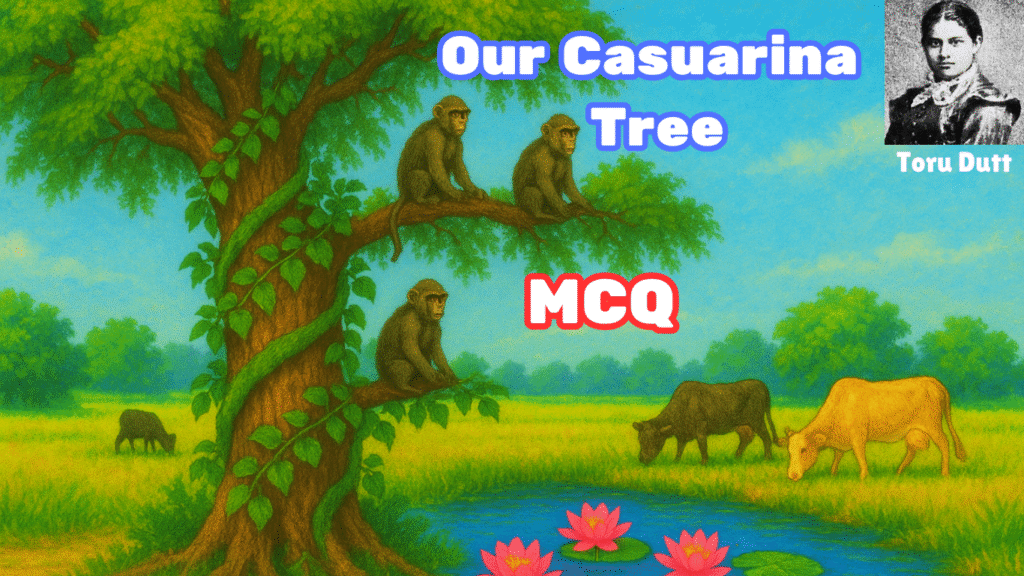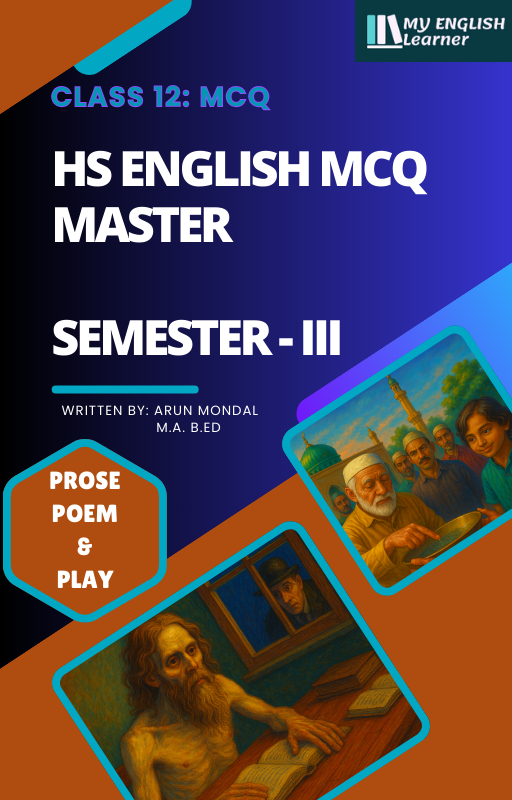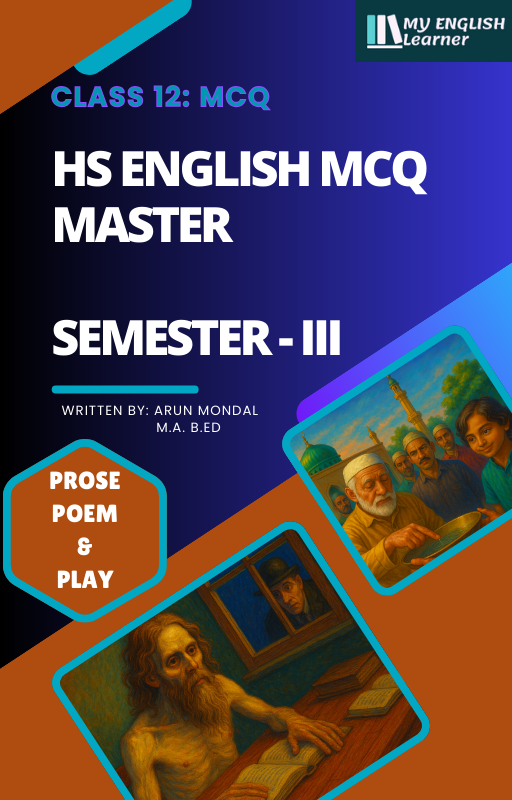
1) Who is the Writer of the poem “Our Casuarina Tree”?
A) Sarojini Naidu
B) Kamala Das
C) Toru Dutt
D) Rabindranath Tagore
Answer: C) Toru Dutt
2) ‘Our Casuarina Tree’ is a/an –
A) sonnet
B) ode
C) elegy
D) dramatic monologue
Answer: B) ode
3) What is the Casuarina tree symbolic of in the poem ‘Our Casuarina Tree’?
A) Nature’s cruelty
B) Nature’s wonder
C) Childhood memories and loved ones
D) Supernatural beliefs
Answer: C) Childhood memories and loved ones
4) The poem, ‘Our Casuarina Tree’ was published in the poetry collection –
A) Lyrical Ballads
B) Ancient Ballads and Legends of Hindustan
C) Song Offerings
D) Sanchita
Answer: B) Ancient Ballads and Legends of Hindustan
5) The poem, ‘Our Casuarina Tree’ was published in the year –
A) 1880
B) 1881
C) 1882
D) 1885
Answer: B) 1881
6) What is winding round and round the trunk of the Casuarina Tree?
A) a creeper
B) a python
C) a climber
D) a vine
Answer: B) a python
7) The creeper is described in the poem, ‘Our Casuarina Tree’ as
A) Tiger
B) squirrel
C) Baboon
D) Python
Answer: D) Python
8) “Like a huge Python, winding round and round” – The figure of speech used in the poem is –
A) Simile
B) Metaphor
C) Personification
D) Hyperbole
Answer: A) Simile
9) The trunk of the Casuarina tree is described as
A) soft
B) rugged
C) tough
D) shiny
Answer: B) rugged
10) “…… indeed deep with scars” – What causes the scars on the Casuarina tree?
A) men cut the tree cruelly
B) a python
C) a creeper
D) a climber
Answer: C) a creeper

11) What is the tree, in the poem, ‘Our Casuarina Tree’ compared to in its grandeur?
A) A temple
B) A gallant warrior
C) A ship
D) A chariot
Answer: B) A gallant warrior
12) “But gallantly the giant wears the scarf,” – What does the ‘scarf’ refer to here?
A) a spiral climber
B) a curling creeper
C) a cluster of flowers
D) a coiling python
Answer: B) a curling creeper
13) “Giant wears the scarf” is an example of —
A) Simile
B) Metaphor
C) Personification
D) Irony
Answer: C) Personification
14) The very summit of the casuarina tree grows near the –
A) moon
B) stars
C) sun
D) sky
Answer: B) stars
15) “Up to its very summit near the stars,” – What figure of speech is used in the line?
A) simile
B) metaphor
C) personification
D) hyperbole
Answer: D) hyperbole
16) The flowers hung from the Casuarina tree is _________ in clour?
A) white
B) pink
C) yellow
D) crimson
Answer: D) crimson
17) Who gathered in the casuarina tree throughout the day?
A) insects and worms
B) bird and bee
C) pythons
D) all of these
Answer: B) bird and bee
18) When does the garden overflow with one sweet song?
A) at night
B) at morning
C) at evening
D) all day
Answer: A) at night
19) “The garden overflows with one sweet song” – Whose song overflows the garden?
A) cuckoo
B) darkling
C) nightingale
D) dove
Answer: B) darkling
20) The poet opens her wide casement at
A) dawn
B) morning
C) afternoon
D) night
Answer: A) dawn
21) When the poet opens the casement at dawn, her eyes rest on –
A) the garden
B) the birds
C) the baboons
D) the casuarina tree
Answer: D) the casuarina tree
22) Where does the baboon sit on the casuarina tree?
A) on the lower branch
B) on the crest
C) on the side branch
D) none of the above
Answer: B) on the crest
23) When does the baboon’s family come to stay on the casuarina tree?
A) winter
B) summer
C) spring
D) rainy season
Answer: A) winter
24) What does the baboon watch sitting quietly on the branch?
A) the ground
B) the sunrise
C) its cubs
D) the blue sky
Answer: B) the sunrise
25) Where are its puny offspring?
A) on the lower branches
B) on the upper branches
C) on the ground
D) on the crest
Answer: A) on the lower branches
26) What do the puny offspring do in the casuarina tree?
A) fight among themselves
B) leap about and play
C) eat the leaves
D) always hanging by their tails
Answer: B) leap about and play
27) The sleepy cows are moving towards their –
A) ground
B) offspring
C) pastures
D) tank
Answer: C) pastures
28) The casuarina tree casts its shadow on the –
A) lake
B) river
C) pastures
D) tank
Answer: D) tank
29) What springs in large numbers in the tank of the poet mentioned in the poem, ‘Our Casuarina Tree’?
A) lotus
B) water-lily
C) Water Poppy
D) Hawthorn
Answer: B) water-lily
30) “The water-lilies spring, like snow enmassed.” The figure of speech used in the poem is –
A) simile
B) metaphor
C) personification
D) onomatopoeia
Answer: A) simile
31) The poet used to ________ with her companions beneath the casuarina tree.
A) chat
B) sing
C) sing
D) play
Answer: D) play
32) “ O sweet companions, love with love intense”. Here ‘sweet companions’ refers to are —
A) Her friends from school
B) Her siblings
C) Her teachers
D) Her children
Answer: B) Her siblings
33) “For your sakes, shall the tree be ever dear.” Why does the casuarina tree hold a special place in the poet’s heart?-
A) for its shadow
B) for its crimson flowers
C) for the memories of her companions
D) for its shelter of birds and animals
Answer: C) for the memories of her companions
34) “..dirge-like murmur that I hear” – What does the phrase ‘dirge-like murmur’ imply in the line?
A) the wind’s mourning
B) the rain’s wail
C) the tree’s lament
D) the broad tank’s joy
Answer: C) the tree’s lament
35) “Unknown, yet well known to the eye of faith!” What does the line signify?
A) The unknown land is full of horrors
B) The unknown land is full of dreams
C) The unknown land is mysterious but familiar
D) The unknown land is full of despair
Answer: C) The unknown land is mysterious but familiar
36) “Unknown, yet well known to the eye of faith!” The poetic device used in the line is –
A) personification
B) oxymoron
C) paradox
D) oxymoron
Answer: D) oxymoron
37) “I have heard that wail far, far away in distant lands” Here, the phrase ‘distant lands’ refers to –
A) England or Australia
B) India or Bangladesh
C) France or Italy
D) Japan or China
Answer: C) France or Italy
38) “I have heard that wail far, far away in distant lands” Whose ‘wail’ is referred to here?
A) the tree
B) the baboon
C) the darkling
D) the Kokilas
Answer: A) the tree
38) “Earth lay tranced in a dreamless swoon” What does the phrase signify?
A) The Earth is full of remorse
B) The Earth is in pain
C) The Earth is in deep sleep
D) The Earth is full of joy
Answer: C) The Earth is in deep sleep
39) What does the poet consecrate to the casuarina tree as a tribute?
A) poem
B) lay
C) epithet
D) novel
Answer: B) lay
40) “Who now in blessed sleep, for aye, repose”. What does the phrase ‘blessed sleep’ signify in this line?
A) sound sleep
B) death
C) rest
D) swoon
Answer: B) death
41) “Who now in blessed sleep, for aye, repose”. Who are in ‘blessed sleep’?
A) the poet’s loved ones
B) the poet’s forefathers
C) the tree with its creatures
D) all of these
Answer: A) the poet’s loved ones
42) What makes the tree ‘dear’ to the poet in the poem ‘The Casuarina Tree’?
A) Its beauty
B) Its fruits
C) Its association with loved ones
D) Its historical significance
Answer: C) Its association with loved ones
43) The tree evokes memories of —
A) School and education
B) Lost childhood and lost loved ones
C) Travel and adventure
D) Victory and pride
Answer: B) Lost childhood and lost loved ones
44) “May love defend thee from oblivion’s curse.” Here the phrase “Oblivion’s curse” refers to —
A) The pain of sickness
B) The danger of death
C) The fear of being forgotten
D) The burden of knowledge
Answer: C) The fear of being forgotten
45) In the poem ‘The Casuarina Tree’, the tree primarily represents —
A) Power and victory
B) Change and decay
C) Permanence of memory
D) Religious faith
Answer: C) Permanence of memory
46) What is the poet’s emotional tone, we find in the poem ‘The Casuarina Tree’ —
A) Sarcastic
B) Humorous
C) Nostalgic
D) Indifferent
Answer: C) Nostalgic
47) The poem, ‘The Casuarina Tree’ ends with a tone of —
A) Joy
B) Hope and blessing
C) Warning
D) Doubt
Answer: B) Hope and blessing

Read more about:
The Night Train at Deoli – MCQ